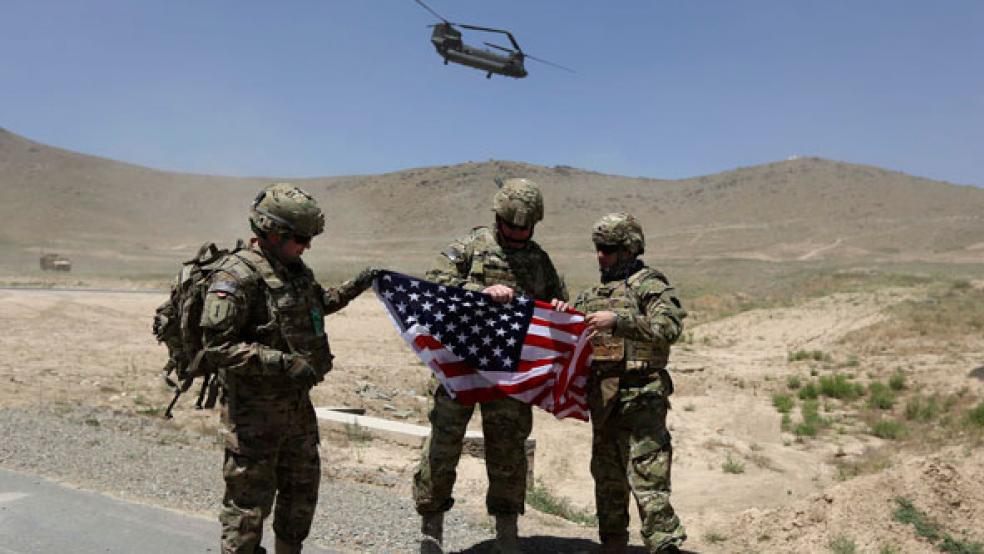President Obama is reportedly considering abandoning his plan of leaving a small residual force in Afghanistan after the majority of U.S. troops leave next summer.

The so-called “zero option” is said to be under consideration following another disastrous encounter between the president and his Afghan counterpart Hamid Karzai. The New York Times reported on Tuesday that during a June 27 videoconference between the two aimed at smoothing over Afghanistan’s withdrawal from peace talks with the Taliban, Karzai accused Obama of attempting to negotiate peace with both the Taliban and Pakistani backers, exposing Afghanistan to its enemies.
This is not the first time Karzai has made this accusation, as The Times noted. But he’s never made it directly to the president. Obama fired back that American lives have been lost protecting the Karzai government. The president was apparently considering the zero option before the call, and officials said the possibility of its happening increased after it.
The relationship between Washington and Kabul has been in tatters for months now. The United States has lost too many lives and spent too much money on a country that’s likely to fall apart as soon as the U.S. military leaves.
Here are five reasons the zero option is the best one on the table.
1. Obama can’t trust Karzai. It’s been clear for months that the relationship between Karzai and the United States is broken beyond repair. Karzai’s pullout from the peace talks is the latest in a long series of snubs toward Washington. In March, Karzai said U.S. troops were supporting the Taliban just as Defense Secretary Chuck Hagel arrived in Kabul.
Prior to that, he ordered U.S. Special Forces to leave a key province just as the fighting season began (the order was ignored). He also accused American soldiers of harassing students – but had no proof to show for it.
At the same time, Karzai has been tainted by corruption for years. He, his family and his associates have been implicated in scandals connected to the drug trade, election fraud and abuse of U.S. money.
His refusal to participate in peace talks that would benefit him and his country should be the last straw. He simply is not a reliable partner.
2. There is no guarantee U.S. troops will make any difference. Afghan security forces have shown themselves to be almost completely inept. They’re behind on training, the retention rate is far too low, and they’re poorly organized. They don’t know how to use much of the equipment the United States has provided to them. They’re soldiers who are not up to the task.
This means there’s no guarantee that any of the advances the United States has made there will last. Why keep even a small number of American troops in harm’s way if the country is eventually going to revert to the lawless tribal land it was before the war?
3. U.S. allies are sick of this war. The American public isn’t alone in its war fatigue. American allies are tiring of this war, too.
Pew Global Attitudes polling has shown that international opposition to the war has been growing for years. In March, public support of the war in Britain nosedived when the country recorded its 400th death in the war. The war has never been popular in Germany or France.
The United States should now be working with these allies to combat cyber terrorism and the growing al Qaeda threat in Africa and the Arabian Peninsula. The days of worrying about keeping Kandahar have long passed.
4. The United States is wasting money. There’s been no end to the tales of waste, fraud and abuse connected to the Afghan war and development spending. The Pentagon has no idea what its 100,000-strong contracting army is doing there. The DOD, USAID and the State Department similarly have no clue where hundreds of billions of dollars have ended up. In some cases, it’s been in the hands of the Taliban. And Karzai’s government has just slapped Washington with a $1billion tax bill.
In an April interview with The Fiscal Times, Special Inspector General for Afghanistan Reconstruction John Sopko said that immediate action needed to be taken to determine whether or not to continue funding projects in Afghanistan. So far, nothing has been done. Spending money in Afghanistan means throwing it into the abyss.
5. The United States has given enough life and treasure to Afghanistan. According to the National Priorities Project’s Cost of War website, http://costofwar.com/ the United States has spent $664 billion on the war in Afghanistan. If funding for the war continues, add another hundred billion to that number. Right now, this is money that’s being wasted, money that would do more good at home.
But the financial cost pales in comparison to the human cost. Nearly 2,250 soldiers have lost their lives in Afghanistan, according to the Pentagon. An additional 18,886 were wounded. Many of these soldiers have suffered tremendous injuries that will haunt them for the rest of their lives.
Most American would agree that no more blood or treasure should be spilled for an ungrateful partner.




